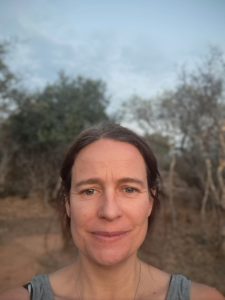
Nicola Stevens
Associate Professor and Tutorial Fellow in Physical Geography
Academic background
Nicola completed her PhD at the University of Cape Town (2015), examining the impacts of global change on dominant woody plants in South African savannas. Prior to this, she obtained an MSc in Ecology and Evolution from Rijksuniversiteit Groningen, following an undergraduate degree in Zoology and Botany at the University of the Witwatersrand, South Africa.
Before joining Oxford, Dr Stevens held research and teaching positions at Stellenbosch University, the South African Environmental Observation Network, and the University of the Witwatersrand. She was a Lead Author for the Intergovernmental Panel on Climate Change (IPCC) Sixth Assessment Report and currently until recently served on the editorial advisory board of Environmental Research Letters. In between academic pursuits she spent a long time living and working in protected areas in South Africa as a guide and field assistant tracking animals from buffalo to wilddogs.
Teaching
Undergraduate: Nicola teaches on the Preliminary Examination teaching in the Ecology module of ESP and Final Honour School (FHS) in geography. For prelims she teaches in the Ecology module of ESP and for FHS the global biotic change component of ESD. She also is involved in the Whytham woods field trip in Trinity term.
Graduate: Nicola teaches the Conservation biogeography and Disturbance modules of BCNr Msc program.
Research interests
Nicola’s research focuses on the ecology, biodiversity, and conservation of non-forested ecosystems, particularly African savannas. She is interested in how global change drivers—such as fire, herbivory, climate change, and rising atmospheric CO₂—are reshaping the structure, composition, and function of these ecosystems. Her work has highlighted the widespread impacts of woody plant encroachment, shifts in biodiversity, and the consequences of these changes for ecosystem services.
She combines field ecology, experiments, and modelling with approaches such as remote sensing to better understand vegetation dynamics and to test scalable methods for monitoring ecosystem change. Increasingly, her research is aimed at exploring nature-based solutions, including the role of herbivores in carbon cycling, and assessing the trade-offs between carbon storage, biodiversity, and livelihoods.
Nicola is also engaged at the science–policy interface, contributing as a Lead Author to the IPCC Sixth Assessment Report and advising on climate and biodiversity policy in Africa. She has a strong interest in interdisciplinary collaboration and in ensuring that ecological research informs conservation practice and policy.
Recent Publications
See google scholar profile for most updated list: https://scholar.google.co.za/citations?user=-xKOpCAAAAAJ&hl=en
Selected list
Loft, T., Oliveras Menor, I., Stevens, N., Clements, H., Santini, L., Thomas, S., Tobias, J., … & Malhi, Y. (Accepted). Energy flows reveal declining ecosystem functions by animals across Africa. Nature.
Stevens, N., & Bond, W.J. (2024). A trillion trees: carbon capture or fuelling fires? Trends in Ecology & Evolution, 39(1), 1–4.
Parr, C.L., Te Beest, M., & Stevens, N. (2024). Conflation of reforestation with restoration is widespread. Science, 383(6684), 698–701.
Loft, T., Cardoso, A., Bond, W.J., Gonçalves, F.M.P., Machado, M., Oliveras Menor, I., … & Stevens, N. (2024). Central Africa’s mesic savannas should be conserved, not afforested. Global Change Biology, 30(6), e17369.
White, J.D.M., Stevens, N., Fisher, J.T., & Reynolds, C. (2024). Woody plant encroachment drives population declines in 20% of common open ecosystem bird species. Global Change Biology, 30(6), e17340.
Skhosana, F.V., Stevens, N., Maoela, M.A., Archibald, S., & Midgley, G.F. (2025). The impacts of woody encroachment on nature’s contributions to people in North America and Africa: A systematic review. People and Nature.
Knowles, T., Stevens, N., Amoako, E.E., Armani, M., Barbosa, C., Beale, C., … & Archibald, S. (2025). Viability and desirability of financing conservation in Africa through fire management. Nature Sustainability, 8(3), 226–233.
Pilon, N., Peixoto, F., Oliveira, R.S., Oliveira, A.C.C., Alquéres, J., Alvarado, S., … & Stevens, N. (2025). Open letter: There are more than just trees and forests to be conserved and restored. Plants, People, Planet, 5.
Gopalakrishna, T., Rifai, S.W., Ratnam, J., Oliveras Menor, I., Stevens, N., & Malhi, Y. (2024). The distribution and drivers of tree cover in savannas and forests across India. Communications Earth & Environment, 5(1), 399.
Mochi, L.S., Morrison, T.A., Stevens, N., Mazía, N., Anderson, T.M., & Holdo, R.M. (2024). Grass layer limits tree seedling survival but not tree seedling growth in African and South American savannas. Journal of Vegetation Science, 35(4), e13302.
Ernst, Y., Archibald, S., Balzter, H., Chevallier, F., Ciais, P., Fischer, C.G., … & Stevens, N. (2024). The African regional greenhouse gases budget (2010–2019). Global Biogeochemical Cycles, 38(4), e2023GB008016.
Millan, M., Ottaviani, G., Beckett, H., Archibald, S., Mangena, H., & Stevens, N. (2024). Disentangling the effect of growth from development in size-related trait scaling relationships. Plant Biology, 26(3), 485–491.
Aguirre-Gutiérrez, J., Stevens, N., & Berenguer, E. (2023). Valuing the functionality of tropical ecosystems beyond carbon. Trends in Ecology & Evolution, 38(12), 1109–1111.
Stevens, N., Bond, W.J., Feurdean, A., & Lehmann, C.E.R. (2022). Grassy ecosystems in the Anthropocene. Annual Review of Environment and Resources, 47, 25–55.
Parmesan, C., Morecroft, M.D., Trisurat, Y., Adrian, R., Anshari, G.Z., Arneth, A., … & Stevens, N. (2022). Terrestrial and freshwater ecosystems and their services. In: Climate Change 2022: Impacts, Adaptation and Vulnerability. Contribution of Working Group II to the IPCC Sixth Assessment Report. Cambridge University Press.